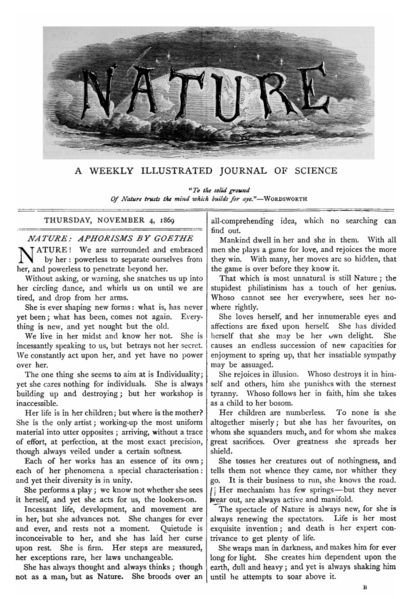

First title page of the scientific journal Nature, November 4th, 1869.
Following the Supreme Court's decision in Bilski v. Kappos, the United States Patent and Trademark Office (USPTO) plans to release new guidance as to which patent applications will be accepted, and which will not. As part of this process, they are seeking input from the public about how that guidance should be structured.
Normally when the USPTO solicits feedback like this, they hear almost exclusively from patent attorneys who have a vested interest in making sure that patents are granted as broadly as possible. And this process will be overseen by David Kappos, the current director of the USPTO and formerly an attorney at IBM in charge of their heavy-handed patent strategy. The company obtained large numbers of software patents with his oversight (and has continued to do so after his departure).
Identi.ca, the FSF says that the "USPTO is preparing post-Bilski guidance for issuing patents—tell them to leave software out of it! Due Monday."
Continued good news in the fight to bust bad software patents: the Patent Office has issued an encouraging office action in the reexamination of the C2 patent, one of EFF's "Most Wanted" patents. The C2 patent claims to cover a “Method and Apparatus for Implementing a Computer Network/Internet Telephone System,” broad enough to essentially wholesale claim using the Internet to call someone’s phone.
The Patent Office has agreed with many of the arguments EFF put forth in its petition for reexamination, and preliminarily found the C2 patent invalid as obvious. This first office action is non-final, which means that C2 still has the chance to respond and make its own argument in support of its patent. While this office action is not a final victory, it’s an important first step in busting a patent that stifles innovation and the use of VoIP as a free speech tool, and further cripples the progress of VoIP developers who seek to ease online communications.
“No word about the cost of patenting for society, the bias of the patent system towards big corporations, the toll of bogus patents on innovation, and the very shaky empirical foundation on which the whole "patents foster innovation" argument rests.”
--GezaSomebody from the FFII's mailing list, Geza, has found this article which he called "a pretty one-sided article about the European patent system an the way to reform it appeared in the current issue of Nature" (high-impact journal/magazine).
"It essentially argues that a more streamlined, US-like system is all we need to foster innovation," he wrote. "No word about the cost of patenting for society, the bias of the patent system towards big corporations, the toll of bogus patents on innovation, and the very shaky empirical foundation on which the whole "patents foster innovation" argument rests."
"Professors without patents" is an article Glyn Moody has just drawn attention to. In it, the case is made for entrepreneurship to be achieved without patent monopolies and rather by collaboration. Nature magazine turns out to have published part of this work in July, so maybe there is balance in coverage:
The results of a recent study challenge the standard notion that most businesses started by academics are based on patents (“Start-up model patently flawed”) in Nature magazine, July 2010).
The study found that the majority of companies started by US academics are started without patents. This is contrary to the generally accepted wisdom about how entrepreneurship occurs in a university, which usually goes something like this: academics disclose their invention to universities, get it patented and then spin-out their company from the university. This is actually only part of the entrepreneurial picture in universities — and a smaller part of the picture at that.
Newegg.com will appeal a recent court decision that awarded an e-commerce application development company damages for Newegg’s alleged violation of several software patents, including a shopping cart.
- Just 16.7% of the assertions of the most-litigated patents were made by product-producing companies.
- Software patents constituted 20.8% of the once-litigated patents but 74.1% of the most-litigated patents.
- Owners of non-software patents are far more likely to win their cases than are software patent owners (37.1% versus 12.9% overall)
- The number of defendants per case is a negative predictor of settlement - the more defendants there are per case, the less likely the case is to settle. Also, the more defendants there are per case the more likely those defendants are to win.